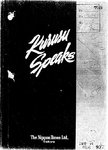diddyriddick
Staff Sergeant
This may be a reach. I've been doing a little snooping for a project, and I've hit a brick wall. I'm trying to find original sources for the Japanese viewpoint prior to Pearl Harbor. Specifically, I'd like the view of the senior military leadership as well as newspaper accounts to get a feel for the opinion of the "man on the street."
What were the Japanese thinking about their potential enemy?
Almost forgot....My limitations are that I don't speak Japanese, and don't want to travel, so on-line translations would be a big help.
What were the Japanese thinking about their potential enemy?
Almost forgot....My limitations are that I don't speak Japanese, and don't want to travel, so on-line translations would be a big help.

